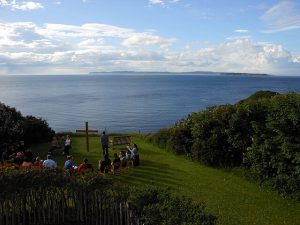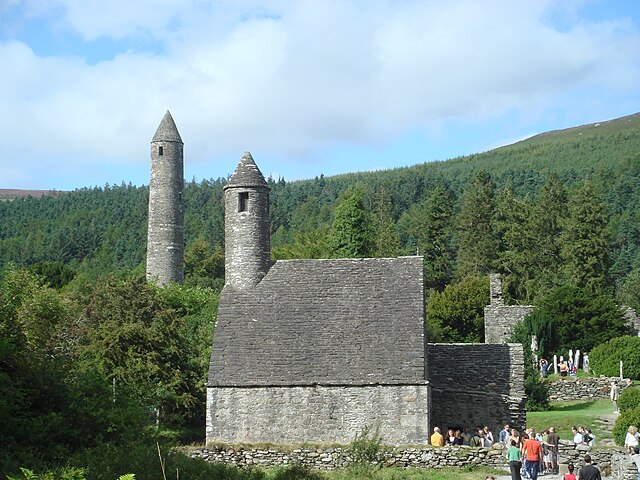Depicted above: Glendalough Monastery, Wicklow County, Ireland
Now that the pandemic’s travel restrictions are behind us, churches are once again visiting distant parts of the world. When we head out, however, we are not tourists, but pilgrims. According to Progressive Pilgrimage, a small company that plans custom experiences for church groups, a pilgrimage is “a trip that is spiritually motivated. Pilgrims travel to sacred sites to follow in the footsteps of their spiritual forebears, to encounter the divine, and to deepen their personal faith.” These pilgrimages can be life changing.
A Pilgrimage to Ireland
As associate pastor of Sewickley Presbyterian Church, I planned and participated in a pilgrimage to Ireland in October 2024. The trip was for members and friends of the church. Twenty-two pilgrims went to study Celtic Spirituality and to gain a better understanding of “The Troubles” (prolonged ethno-nationalist conflict with division along lines of religious practice) that have plagued Ireland for decades.

We landed in Dublin and immediately traveled south to the ruins of the ancient monastic city of Glendalough. Founded in the sixth century by St. Kevin, these ruins allowed us to feel as if we were a part of this ancient Christian community that not only worshipped together, but lived, worked, and studied together as well. As we passed through the archway entrance, we touched a cross etched in a wall of stone. You couldn’t help but feel a certain peaceful spirit emanating from it that brought a kinship with the faithful of old. While there, I held communion for our group on a large tree stump in the valley as we connected with God in nature like the Celts did.
From there, we went to Kildare to get to know St. Brigid, a patron saint of Ireland. Her legacy is kept alive at the Solas Bhride Centre by the nuns who devote themselves to living as Brigid did: fostering peace, being faithful to the gospel, providing charity for the poor, and celebrating women in the life of the church. Many in our group were touched by Brigid’s life and legacy.
Of course, any pilgrimage to Ireland would be incomplete without learning of St. Patrick, which we did in Downpatrick at the St. Patrick Centre. His name is on so many churches in Ireland, both Roman Catholic and Church of Ireland. We toured five of them: two in Armagh, one in Downpatrick, one in the countryside called “Saul’s Church,” and the huge cathedral in Dublin. St. Patrick’s presence on Ireland’s religious landscape cannot be overstated. He began as a slave, forcibly brought to Ireland, who escaped and returned in 432AD after hearing God call him back to share the gospel. Some of what we heard was legend, but without question, he built on Ireland’s native religious practices to make the gospel real to the Celts.
Corrymeela: Intentional Christian Community

Probably the most meaningful part of the pilgrimage for me was our time at Corrymeela in Northern Ireland. Located on the beautiful Antrim Coast, Corrymeela is an intentional Christian community dedicated to peacemaking around the world. While originally founded to make peace between Irish Catholics and Protestants, their current mission stretches internationally as they bring conflicted people together in Christ. It was so moving to talk with the workers there and hear about their call to bring peace.
There were more stops along the way than I have room to discuss, but I will conclude by saying that every alum and their church members should try to make a pilgrimage at some time. It may be to a local retreat center or to a destination far away, but to connect with Christians of old and to spend intentional time with God will benefit all of our lives of faith. I personally know of PTS alums who have gone to the Holy Land, Scotland, France, Japan, the Czech Republic, and other locales to deepen their faith. The lessons learned on pilgrimage are invaluable for teaching, preaching, and personal growth. I encourage everyone to go!
 The Rev. Emily Miller ’07 recently served as associate pastor at Sewickley Presbyterian Church and has accepted a call as interim pastor of John McMillan Presbyterian Church in Bethel Park, Pa. A native of Pittsburgh and proud Irish person, Emily has served two churches in the Pittsburgh area as a student pastor and six churches as an ordained minister. She holds a law degree from the University of Pittsburgh, and she practiced law in both Philadelphia and Pittsburgh.
The Rev. Emily Miller ’07 recently served as associate pastor at Sewickley Presbyterian Church and has accepted a call as interim pastor of John McMillan Presbyterian Church in Bethel Park, Pa. A native of Pittsburgh and proud Irish person, Emily has served two churches in the Pittsburgh area as a student pastor and six churches as an ordained minister. She holds a law degree from the University of Pittsburgh, and she practiced law in both Philadelphia and Pittsburgh.

